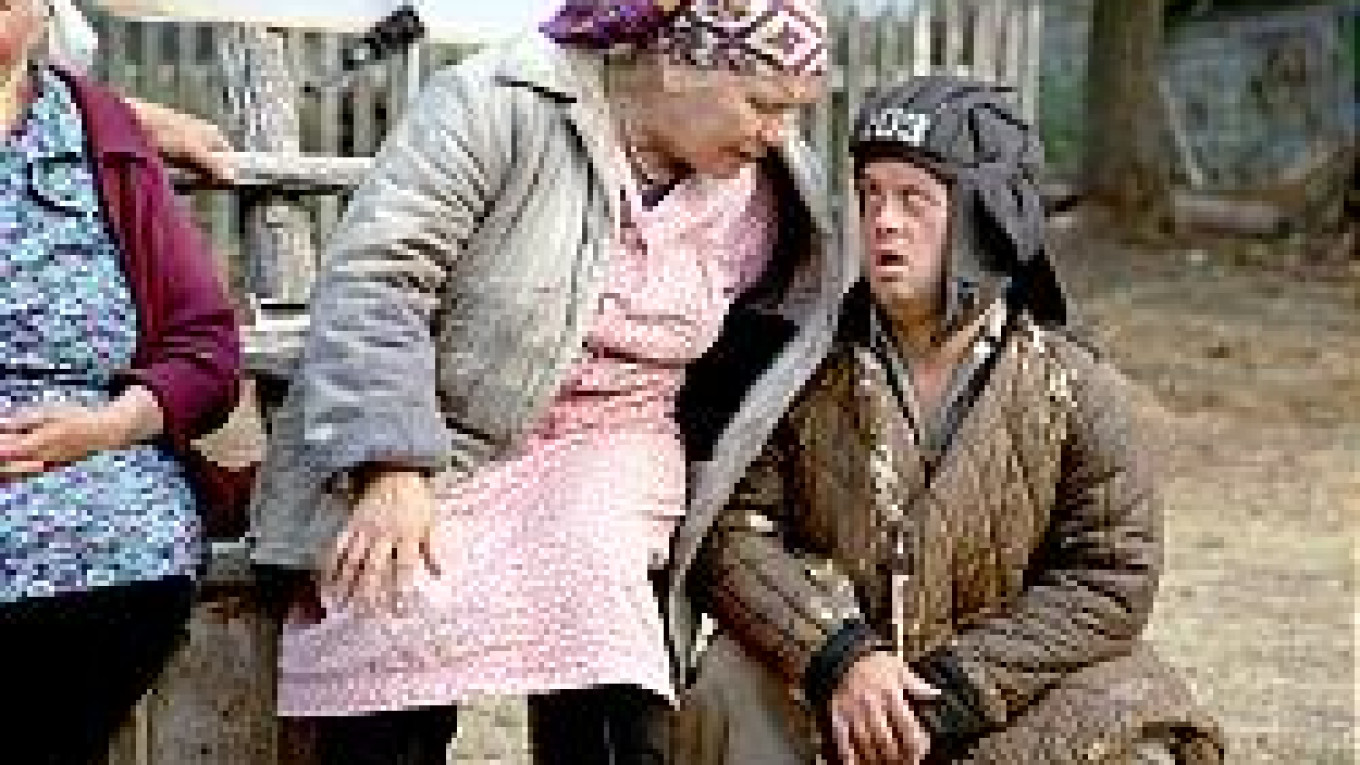Gennady Sidorov's "Old Women" (Starukhi) is a fitting such conclusion to the year. Winner of the top prize at June's Sochi Kinotavr festival, it gathered further acclaim at the San Sebastian festival and elsewhere before reaching Russian screens. Though the comic aspects will score more successfully with a domestic audience, its inherent human sympathy has already found international appreciation without stepping over that fine line termed klyukva (literally, cranberry) -- a certain kind of Russian cultural product that, intentionally or not, seems "made for export."
It isn't specified exactly where in Russia the film's action takes place, but the location is universal -- a distant and empty agricultural landscape, a deserted village where the electricity has long since been turned off and whose few remaining inhabitants are the old women of the title. The only male in the place, Mikolka (Sergei Makarov) has Down syndrome and helps with cow herding and other passing chores.
It's about as remote from civilization as we can imagine -- whether only hundreds of kilometers from Moscow or thousands, there is no difference. The nearest reminder of anything like the outside world is a local tank battalion, whose captain, played by director Sidorov himself, has an almost feudal role. He is more than happy to turn the facilities of his division to everyday village tasks in return for the more-than-generous doses of moonshine that the old women prepare. While his more usual kind of assistance involves sending his soldiers to help dig a grave for the funeral with which the film opens, in one of the finest comic moments, the captain launches a tank shell onto an abandoned wooden house to help the old women plunder its timber for firewood.
Into the midst of this simultaneously comic, grotesque and perversely generous world comes a family of refugees from Central Asia. In fact, the refugees are from Tajikistan, although their exact origin -- like their language, which remains untranslated -- is never stressed. Moving into a rumble-down wooden house, they soon manage to transform it into a colorful Eastern home.
The contrast between the two worlds is beautifully presented in visual images, with the dark greens of the Russian landscape juxtaposed against the bright red, yellow and orange fabrics of the East, and the elderly Tajik patriarch, with his long gray beard, going out to the fields for his ritual prayers.
But conflict rears its head. Overhearing the local women lamenting the arrivals, Mikolka acts on his simple instincts and sets fire to the newcomers' dwelling. Faced with the consequences of its inherent racism, the village compensates with natural and basic human generosity, leading to many comic moments along the way. In return, the strangers display an enterprising initiative and get the electric generator working again. The result is a celebration that's literally illuminating.
It's not what happens here that matters, though, but how it's played. Instead of hiring professional actors to play the villagers, Sidorov filmed real Russian provincials in their original trappings -- costumes, leggings and all. Sidorov and Makarov, who performs together with other actors with Down syndrome at Moscow's Theater of Simple Souls, are among the few professionals. The casting brings a beguiling reality to the story.
Elements of documentary in "Old Women" recall a striking 1999 film, "Bread Day" (Khlebny Den) by Sergei Dvortsevoy, which similarly mixed the boundaries between fiction and fact. The result is much closer to the British tradition of comic social drama than to other, more crafted, European trends, with hints of the cross-culture dynamic of Damien O'Donnell's "East Is East."
However, there are connections closer to home, as well. Sidorov's film school contemporary, and former partner, Larisa Sadilova, also used non-professional actors for her first film, "Happy Birthday" (S Dnyom Rozhdeniya), a masterfully human picture of the emotional comings-and-goings at a provincial maternity hospital. Sidorov also appeared in Sadilova's second work, "With Love, Lilya" (S Lyubovyu Lilya), a more feature-like film about a woman who works in a provincial broiler factory.
Sidorov and Sadilova represent a counter-trend to the willfully dark presentation of post-Soviet reality commonly known as chernukha. Relishing their backwoods settings, they maintain an emotional conviction and belief in their characters that saves them from caricature. It's not a regional or rural world that we're meant to see in "Old Women" -- it's human life.
"Old Women" (Starukhi) opens Jan. 1 at Khudozhestvenny Teatr and Pyat Zvyozd. See listings for showtimes.
A Message from The Moscow Times:
Dear readers,
We are facing unprecedented challenges. Russia's Prosecutor General's Office has designated The Moscow Times as an "undesirable" organization, criminalizing our work and putting our staff at risk of prosecution. This follows our earlier unjust labeling as a "foreign agent."
These actions are direct attempts to silence independent journalism in Russia. The authorities claim our work "discredits the decisions of the Russian leadership." We see things differently: we strive to provide accurate, unbiased reporting on Russia.
We, the journalists of The Moscow Times, refuse to be silenced. But to continue our work, we need your help.
Your support, no matter how small, makes a world of difference. If you can, please support us monthly starting from just $2. It's quick to set up, and every contribution makes a significant impact.
By supporting The Moscow Times, you're defending open, independent journalism in the face of repression. Thank you for standing with us.
Remind me later.


